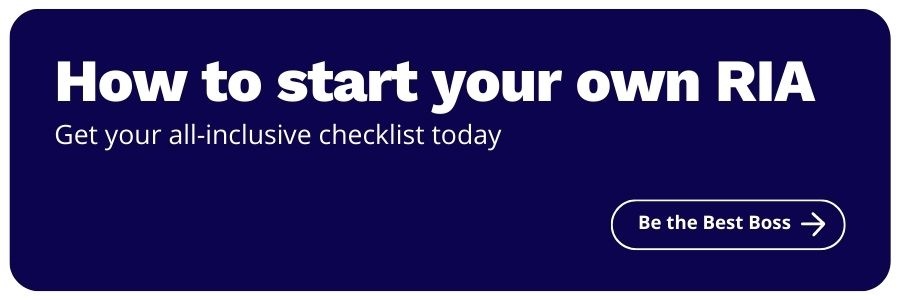Choosing a Niche for Your Financial Planning Firm
Share this
There was a question posted recently on XYPN's VIP Facebook group that was just begging to have an article written about it. The question was, "How could a person evaluate whether a niche was worth pursuing?" Some answered the question and some weighed in and said "finding" a niche wasn't a good way to go.
I immediately knew there was something to this and decided to explore it a little more. I did a little checking and also some reflection abou how I chose my niche for my firm. It's funny how everyone has their own opinion of how to chosse a niche. It proves that, like almost all things in business, there is more than one way to skin a cat.
One thing that we can all agree on is that as you get deeper and deeper into your niche, you start to lower your cost of client acquisition and you also start to speed up your client growth. I sense a win-win here.
When you're known within your field as a go-to, you become the person to go-to when a quote is needed, just ask Sophia Bera.
Warm Market
The first really great way to find a niche is to simply be in, what people at Northwestern Mutual called, a warm market. A warm market for a recent college grad is basically your family and your fellow students. A warm market for a career changer could be the coworkers, colleagues, and contacts you met within the industry you previously worked. That's the primary definition of a warm market.
I think a warm market could also be the types of clients you worked with at a prior firm. For instance, a firm I worked at had an owner who was skilled with executives and stock compensation. By being there for a year, I had a better read on stock options than most people, which helped with conversations with my niche of startups.
Before that, I worked at a wealth transfer company. That experience allowed me to have comfortable wealth transfer conversations with entrepreneurs about estate planning because I worked in that environment for a year. When you utilize past experience to work into your niche, you are already ahead of the game because you know how your target thinks and how to speak their language. Another pro of having a warm market is that people already know you and may be willing to work with you because the trust that stems from a professional or personal relationship is already there. Then it becomes more of a conversation around your sales skills rather than the ability to build trust and credibility.
The cons of having a warm market is that you can't really choose your niche, you get the hand that you're dealt. If you're like me and passionate about start-ups, but your experiences are in wealth transfer, then your warm market will be the wealthy business owners that have already exited or are close to passing their wealth on. Having a warm market in a group of people that are getting ready to retire isn't really going to help you get to a younger demographic unless you go after their heirs.
Boots on the Ground
A second way of finding a niche is to go out there and search for it.
If you believe you have an idea for a niche and the connections to pursue it (like someone who might have a wife who is an attorney), you can create a niche.
You can ask your spouse to ask their colleagues and co-workers to speak with you and give them an entire script of what to say. The easiest way to get feedback from high-level contacts is to submit questions, not ask them out for coffee. However, meeting face-to-face or over the phone is likely going to build more trust than a simple e-mail questionnaire would generate. This process is, in a sense, conducting an informational interview.
This style of finding a niche is a really good concept because it allows you to figure out who you would like to serve, what they're willing to pay, and also how they want their services to be structured. If you go through this process with a couple of potential niches, you may find that one wasn't as profitable or as enjoyable to work with as you previously envisioned. After having these meeting, you can build what they just told you they wanted, at the price that they said that they are willing to pay.
At the end of that meeting you can say, "I will let you know when we launch because you've helped me build this", and that will create an emotional investment in your business. In turn, this emotional attachment is the foundation for trusting their entire financial future to your upstart firm. Trust me...it's a great feeling to start out with a dozen or so warm leads.
The barriers to getting their business is much lower than the other options of finding a niche to serve. The personal/professional relationship is already established and your first impression was fantastic. Another pro to this method is that you are able to figure out whether you really enjoy the niche or not.
The con to going out and finding a niche is that you are basically cold calling people. This method may feel a little bit more sales-ey and spammy. I cold e-mailed, messaged, and tweeted my target market to take a survey on what my firm's name should be, what we should offer, and how we should offer it. It was definitely spammy but I ended up with a solid amount of leads on day one of my firm's launch.
Natural Selection
The third way to find a niche is to simply serve as many people as you can. You will find who your vision and mission resonates well with and who it doesn't. You'll find what kind of people you like working with and those who you don't.
This path is the way that most advisors in our industry find their niche. It's most definitely a long-play, but that doesn't make it inherently wrong. At the end of the day, helping people make smart financial decisions is the name of the game and if you are serving anyone who can fog a mirror, you are still helping move our profession forward.
After a few years and a few dozen clients, you will begin to notice a pattern...which clients you roll your eyes at when they call or e-mail...which meetings you are looking forward to...and which clients you are more than happy to go out of your way to help (even if it's not a piece of your service model).
This path is great for naturally discovering who you like to work with and why. Unfortunately, it makes the climb to getting recognized in a specific field, industry, or community a lot longer. When you can help everyone, no one knows when to call you (unless you have a scalable process for marketing) and no one knows when specifically to refer you. I've mentioned mindshare before; it's harder to occupy mindshare when you are broad-based in your niche. It is much easier to know who to refer to Lauryn Williams than it is to know who to send to that Merrill Lynch guy (rich people?).
Your cost of acquisition is going to be higher by taking this route, but your revenue target could potentially be larger as well. It's a catch-22. This method is primarily useful if you are already on your way to being known as a generalist.
Examine all of your favorite clients and find their common denominator. Fire or refer out all of the other clients (don't gut your business, be practical). The clients who are left are the ones you should focus on finding more just like. It's amazing how productive and more profitable you become when you're working with people you like, in a capacity you're extremely passionate about.
The plus side of this method is that you will have a built-in method to determine the niche you want to pursue. By simply working with everyone, it's easier to identify the favorites and a pattern in which they follow. If it takes you less time to prospect, sell, close, onboard, and service a client that is an architect, you may want to go with architects.
As you work with your general clients longer, you will figure out what your niche really is and what type of people you actually like to work with. Then, you can also re-design your service and pricing model around the niche that emerges. Those that don't like it are probably not the clients you want long-term anyway.
Conclusion
These are the top ways I would go about deciding a niche and some of the pros and cons for each. I believe that this will be an ongoing conversation and a point of personal preference. It really depends on how you want to build your practice. It depends on what your short-term needs are and what your long-term vision is.
And it depends on your personality as well.
Finally, please remember that your niche doesn't necessarily have to be industry-, age-, or income-based. It could be personality-based as well. Your niche could be working with type-A women, or it could be working with Gen Y couples who have an egalitarian relationship because you function well in conversations where both spouses hold equal weight in all decisions. The amount of niches you can pursue are endless. This can be both daunting and freeing. I hope it's the latter.
About the Author

Stephen Alred first joined XYPN as a member. After working with the team on smaller projects, he was hooked. He now serves as the Director of Advisor Success. He’s worked with multiple companies inside and outside of the financial services industry, specifically in helping them design their marketing and technology strategies.
When he’s not working, you can find Stephen in Atlanta, GA attending a startup event, reading a book at a random coffee shop, or diving into new experiences with his wife Erin.
Share this
- Advisor Blog (720)
- Financial Advisors (243)
- Growing an RIA (128)
- Business Development (94)
- Digital Marketing (94)
- Marketing (91)
- Community (82)
- Start an RIA (76)
- Coaching (73)
- Running an RIA (72)
- Compliance (70)
- Client Acquisition (68)
- Technology (67)
- Entrepreneurship (64)
- XYPN LIVE (64)
- Fee-only advisor (49)
- Sales (49)
- Bookkeeping (46)
- Client Engagement (45)
- Practice Management (44)
- XYPN Books (43)
- Scaling an RIA (42)
- Investment Management (41)
- Client Services (31)
- Employee Engagement (31)
- Lifestyle, Family, & Personal Finance (31)
- Financial Education & Resources (30)
- Market Trends (25)
- Journey Makers (23)
- Process (18)
- Niche (13)
- SEO (9)
- Career Change (8)
- Partnership (8)
- Transitioning Your Business (7)
- Sapphire (6)
- Persona (4)
- Transitioning To Fee-Only (4)
- Emerald (3)
- Social Media (3)
- Transitioning Clients (3)
- RIA (2)
- Onboarding (1)
Subscribe by email
You May Also Like
These Related Stories

How Can You Provide Financial Planning for Younger Clients?
Jun 17, 2015
6 min read






